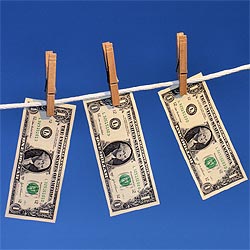Compliance
EXCLUSIVE: Singapore's Temaswiss On Use, Misuse Of Corporate Accounts - Part 1

This publication talks exclusively to Temaswiss, Asia's new domain expertise, training and data science think tank for wealth management, about some of the challenges of anti-money laundering.
Corporate accounts that are to be used to park private wealth in Asia are often serviced outside the private banking area, in the business banking sector. In even the most advanced Asian economies, the design of anti-money-laundering (AML) transaction monitoring processes is woefully inadequate for the job of detecting companies that deviate from their stated purpose. Suvendu Ganguli, COO of Temaswiss, Asia’s new domain expertise training, advisory and data sciences think-tank organisation, answers our questions. (To see an article about Temaswiss, click here.)
If you think that AML processes are inadequate in Asia
and elsewhere, is this because of software?
To say that the processes are inadequate is not to say that the
software is; transaction-tracking software is the same in Asia as
in Europe and the US. Although it might pick out unusual or
unnecessary transactions in a private bank account, however, it
is not really usable for corporate purposes. Its settings do not
detect transactions that are not in line with the stated purpose
of the company in question.
Cases involving small companies are often detected instead by a fluke, perhaps because someone bothers to ask about the purpose of a loan or a transaction. The tools used in the East are no different from the West. In the West, however, the questions asked at the account-opening stage are quite stringent. Moreover, small corporations provide better cover for high-net-worth money-launderers in Asia as small to medium enterprises grow faster there, so mushrooming growth is less of a 'red flag'.
How easy is it to found a company and open a bank
account?
It is very easy to start a company in Hong Kong or Singapore and,
thereafter, to open a bank account – indeed, it is pretty much
child’s play. You only have to find a corporate secretariat firm
on the internet, pay it a very nominal fee and it will equip you
with a local director who might well be a “one-man army”
operating out of his bedroom. You will have to supply a passport
copy or two of the beneficial owners of the new company, you will
then receive a standard Memorandum and Articles of Incorporation
and within thirty minutes you will have registered your company.
If your “corpsec” firm has not directed you to a “preferred” bank by this stage, no matter. Some retail banks take pride in monitoring the company registry and one of their salesmen (otherwise known as a relationship banker) will call you proactively within four hours, asking for your custom. Some corporate secretariat firms even provide limousine service directly from the airport.
Once you have opened a company whose stated purpose is “property investment” or “selling hosiery on the internet,” the typical Asian bank is unlikely to do much checking to see whether the activity the entity really performs is as advertised. Checking is, of course, done at the very beginning, but in most cases (even in the UK) nobody is going to monitor transactions to see if the account activity is in line with the business' stated purpose. The only time a deviation from the stated activity will be detected is during the regulatory “know your customer” periodic review, which occurs once every three to five years. It may be the case at that point that the bank asks the customer whether the nature of the business has changed. For the first 1½ months, nobody is going to check. This is the moment at which the customer is especially safe.
On top of this, the designation of a company's “industry” or
activity leaves it with a great deal of leeway. It can make all
kinds of excuses for not getting round to producing any
identifiable goods or services if it phrases its purpose vaguely
enough. When one registers a company in Vietnam, to take an
extreme example, there is no law to say that one cannot give it a
single standard description that explains very little about it in
any detail. In both Vietnam and Thailand the registry documents
are very standardised and the description of company activities
is very nondescript.
What has your experience been in this field?
I have encountered the “corporate secretariat” problem myself.
For instance, one clued-up relationship manager at my bank kept
the “prospect” waiting in a room and called me in to assess the
situation. A seemingly eloquent young man dressed in Ermenegildo
and white shoes explained how a corpsec had recommended our bank
to him in glowing terms. The prospective “clients” for whom he
was acting were two Bulgarian gentlemen in casual wear who were
conveniently unable to speak English. They were, however, skilled
in the art of synchronised nodding and kept looking at their
watches. A glossy brochure was produced as proof that their
business had revolutionised wind-farming in Spain and was now
looking for a base from which to attract Chinese venture
capitalists.
After a small amount of effort, we found that there was no wind-farming in Spain and that the young man was on Facebook, using the name he gave us but in Mandarin, a language I cannot speak, and advertising himself as a top casino junket-operator. In other words, he was an aggregator who enticed people to go to casinos. Such people organise the terms and aggregate the money for more than one gambler (who has been blacklisted and therefore cannot use his own name) and places bets for them.
This activity, while not banned universally, is highly suspect. It is illegal in Singapore but legal in mainland China, Indonesia and Macao. We never saw those people again, but I strongly suspect that some high-street banks might have accepted them.
In the next instalment we look at personal holding companies and the mis-classification of HNW accounts at Asian banks.